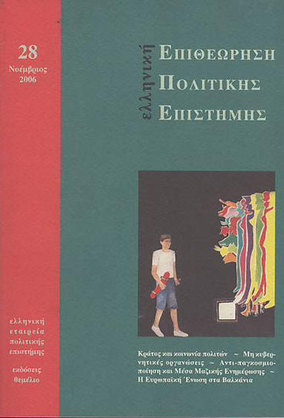Αποσχιστικός εθνικισμός και διεθνής κοινωνία : το σκηνικό χθες και σήμερα
Part of : Ελληνική Επιθεώρηση Πολιτικής Επιστήμης ; No.3, 1994, pages 36-70
Issue:
Pages:
36-70
Parallel Title:
Secessionist nationalism and world society
Author:
Abstract:
The article presents some of the main conclusions that can be drawn regarding secessionist nationalism, the reasons for its eruption, the international normative regime and its international dimension (the character of external involvement by states and intergovernmental organizations) with regard to the period 1945-1989. Following a tentative comparison with the first post- Cold War years (1990-1993), the article concludes by suggesting a new normative regime. Until 1990 the international community was decidedly against secession and support to secessionist movements was frowned upon. Yet there was no shortage of secessionist movements and several of them had discernible external support. However, these clashes were less internationalized than classic civil wars. They were a Third World phenomenon and, in each case, the incumbent government could muster more external support than the secessionists. The scenery has changed with the end of the Cold War, rendering secessionist nationalism one of the most daunting and intractable problems and the main source of armed conflict and threats relating to international peace and security. Secession and support to it is no more beyond the pale. The major cracks in the normative anti-secessionist edifice call for a new international regime on the matter. Trying to resurrect the previous regime in the hope that it can act as a deterrent is not very realistic. The opposite, a laissez-faire approach without a normative beacon is even worse, ushering us into a Darwinian world where «might» would be «right» and secessionist bids would multiply ad absurdum. The suggestion of this article is for an «ethnosocial contract» between state and distinct cultural groups. Should that not be a feasible prospect in a given situation, then the solution could be separation or the partition of the state concerned, provided the following conditions are met: discrimination, ingroup legitimization as regards the minority in question, real prospects for conflict resolution and intransigence on the part of the state concerned.
Subject:
Subject (LC):
Keywords:
εθνικισμός
Notes:
Το άρθρο συνοψίζει και επιχειρεί να διευρύνει τη μέχρι σήμερα σχετική έρευνα του συγγραφέα που καλύπτει την περίοδο του Ψυχρού Πολέμου, Περιέχει βιβλιογραφία




